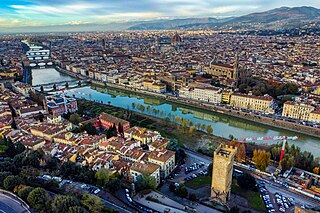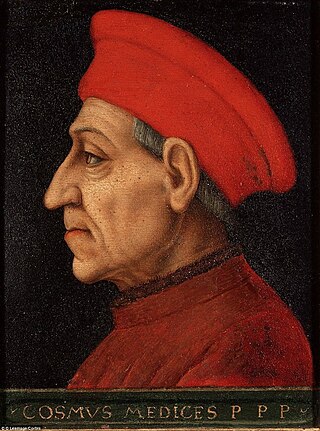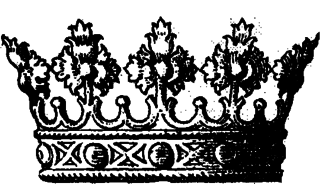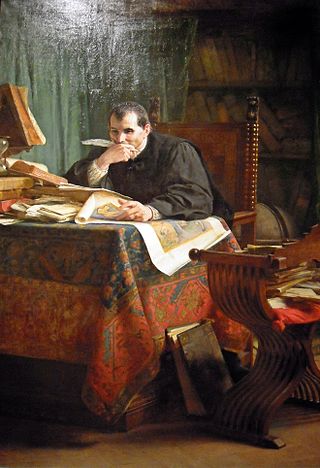See also
- Medici.tv, an online platform
- All pages with titles containing Medici
- Medician (disambiguation)
Medici, Medicis, The Medicis, or The House of Medici were a prominent medieval Florentine family.
Medici also may refer to:

Florence is the capital city of the Italian region of Tuscany. It is also the most populated city in Tuscany, with 360,930 inhabitants in 2023, and 984,991 in its metropolitan area.

Lorenzo di Piero de' Medici, known as Lorenzo the Magnificent, was an Italian statesman, the de facto ruler of the Florentine Republic, and the most powerful patron of Renaissance culture in Italy. Lorenzo held the balance of power within the Italic League, an alliance of states that stabilized political conditions on the Italian Peninsula for decades, and his life coincided with the mature phase of the Italian Renaissance and the golden age of Florence. As a patron, he is best known for his sponsorship of artists such as Botticelli and Michelangelo. On the foreign policy front, Lorenzo manifested a clear plan to stem the territorial ambitions of Pope Sixtus IV, in the name of the balance of the Italic League of 1454. For these reasons, Lorenzo was the subject of the Pazzi conspiracy (1478), in which his brother Giuliano was assassinated. The Peace of Lodi of 1454 that he supported among the various Italian states collapsed with his death. He is buried in the Medici Chapel in Florence.
P.S. commonly refers to:

The House of Medici was an Italian banking family and political dynasty that first consolidated power in the Republic of Florence under Cosimo de' Medici, during the first half of the 15th century. The family originated in the Mugello region of Tuscany, and prospered gradually until it was able to fund the Medici Bank. This bank was the largest in Europe during the 15th century and facilitated the Medicis' rise to political power in Florence, although they officially remained citizens rather than monarchs until the 16th century.

Cosimo di Giovanni de' Medici was an Italian banker and politician who established the Medici family as effective rulers of Florence during much of the Italian Renaissance. His power derived from his wealth as a banker and intermarriage with other rich and powerful families. He was a patron of arts, learning, and architecture. He spent over 600,000 gold florins on art and culture, including Donatello's David, the first freestanding nude male sculpture since antiquity.

Cosimo I de' Medici was the second duke of Florence from 1537 until 1569, when he became the first grand duke of Tuscany, a title he held until his death.

The Republic of Florence, known officially as the Florentine Republic, was a medieval and early modern state that was centered on the Italian city of Florence in Tuscany, Italy. The republic originated in 1115, when the Florentine people rebelled against the Margraviate of Tuscany upon the death of Matilda of Tuscany, who controlled vast territories that included Florence. The Florentines formed a commune in her successors' place. The republic was ruled by a council known as the Signoria of Florence. The signoria was chosen by the gonfaloniere, who was elected every two months by Florentine guild members.

The Duca della Repubblica Fiorentina, rendered in English as Duke of the Florentine Republic or Duke of the Republic of Florence, was a title created in 1532 by Pope Clement VII for the Medici family, which ruled the Republic of Florence. There were effectively only two dukes of the Republic of Florence, Alessandro de' Medici and Cosimo de' Medici, the second duke being elevated to Grand Duke of Tuscany, causing the Florentine title to become subordinate to the greater Tuscan title.
Morello may refer to:
Giacomo Medici may refer to:
Squarcialupi may refer to one of two items:
Elena may refer to:

Niccolò is an Italian male given name, derived from the Greek Nikolaos meaning "Victor of people" or "People's champion".

The Duchy of Florence was an Italian principality that was centred on the city of Florence, in Tuscany, Italy. The duchy was founded after Pope Clement VII, himself a Medici, appointed his relative Alessandro de' Medici as Duke of the Florentine Republic, thereby transforming the Republic of Florence into a hereditary monarchy.

The aristocratic House of Borromeo were merchants in San Miniato around 1300 and became bankers in Milan after 1370. Vitaliano de' Vitaliani, who acquired the name of Borromeo from his uncle Giovanni, became the count of Arona in 1445. His descendants played important roles in the politics of the Duchy of Milan and as cardinals in the Catholic Reformation. In 1916, the head of the family was granted the title Prince of Angera by the King of Italy.

The Medici Bank was a financial institution created by the Medici family in Italy during the 15th century (1397–1494). It was the largest and most respected bank in Europe during its prime. There are some estimates that the Medici family was, for a period of time, the wealthiest family in Europe. Estimating their wealth in today's money is difficult and imprecise, considering that they owned art, land, and gold. With this monetary wealth, the family acquired political power initially in Florence, and later in the wider spheres of Italy and Europe.
Lorenzo de' Medici (1449–1492), or Lorenzo the Magnificent, was an Italian statesman, banker, de facto ruler of the Florentine Republic and patron of Renaissance culture.
Florentine most commonly refers to:
Soderini is an Italian surname and may refer to:
Bicci may refer to: